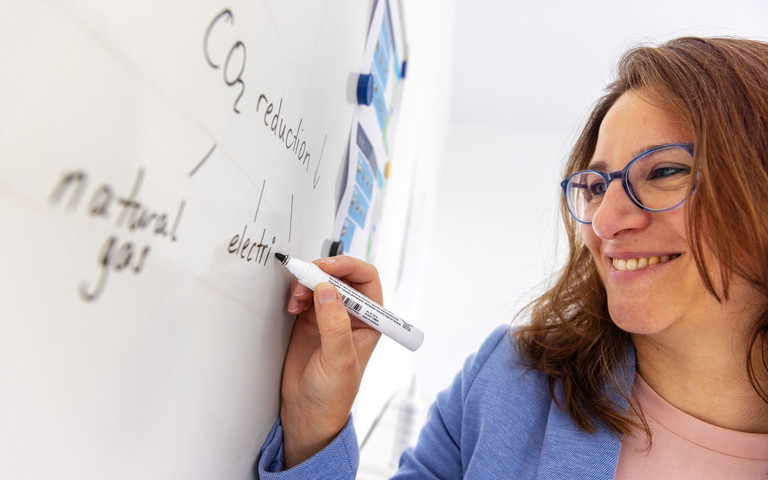Getting people involved in sustainability
Eva Opitz knows the kinds of questions her colleagues often ask: “What’s the difference between electricity and energy? What do Scope 1, 2, and 3 mean? And how can we heat our offices in an environmentally friendly way?” The 38-year-old has therefore compiled a glossary that includes many terms related to sustainability. In it, she clearly explains what each term means. “I want to get my colleagues involved in sustainability,” she says. “They should understand how we work and feel empowered to act accordingly in their everyday tasks.”
Opitz, a qualified environmental engineer, is responsible for sustainability management at the chemical specialist Budenheim. She coordinates efforts to reduce CO2 emissions across all processes – not just at the German site in the state of Rhineland-Palatinate but at all eight production sites worldwide, from the USA to China. To achieve this, she shapes forthcoming changes by introducing targets and detailed implementation plans. Topics range from switching to renewable energy and electrification to tackling the big strategic question: “How can the company’s products and its entire supply chain become more sustainable?”
Quarterly talk series
Since sustainability is to be integrated into all areas of the organization, Opitz maintains a strong presence within the company. She advises teams across all business units, discussing ways to make their work processes greener. Once every quarter, she organizes a “Sustainability Dialogue”, an online event where employees worldwide can participate and discuss a key topic in English.
Because Budenheim views the transition to a sustainable business as a major opportunity, Stefan Lihl, the company’s Managing Director, has become one of Opitz’s key collaborators, alongside what she calls her “sustainability experts” – a group of individuals responsible for sustainability at the various Budenheim locations.
One of Opitz’s greatest successes over the past two years has been the photovoltaic program. Each site has assessed whether and how solar panels can be installed locally. By the end of the year, a total of seven systems will be operational. “I’m still amazed at how quickly we’ve been able to drive forward the expansion of photovoltaics together,” says Opitz. The Spanish plant in El Puig has already transitioned entirely to renewable energy, producing around 40 percent of its own electricity.
While achieving this level of self-generated green energy isn’t feasible in Rhineland-Palatinate due to limited suitable land for solar installations, the goal remains the same: to transition entirely to green energy in the future.
This commitment is already evident in the recently constructed House of Nutrition, a production facility for infant formula and medical nutrition. The building is completely gas-free.
“Our mission is to challenge the status quo,” explains Opitz. “Budenheim has been operating since 1908, so it would be crazy to think everything could stay the same as it was 100 years ago. We’re constantly evolving, and that’s how we ensure our long-term success.”
Expanding the team
The sustainability manager’s role is highly complex. It’s not just about reducing CO2 emissions and optimizing supply chains. A significant part of Opitz’s work involves reporting – demonstrating to both authorities and customers that regulations are being met and targets achieved. This requires collecting and analyzing vast amounts of data and determining key metrics, such as greenhouse gas emissions and energy consumption at all global sites. “Even in a full-time role, I can’t do all of that alone,” says Opitz. “And my Excel skills are being tested to their limits,” she adds with a laugh.
That’s why her team is expanding. Until now, she’s been supported by a sustainability controller. Now, her team is growing with the addition of another sustainability manager and a student trainee. Opitz herself joined Budenheim straight out of university in Bingen.
“I wanted to work in the chemical industry to drive change from within,” she says. After a few years with the company, she completed part-time training to become a certified sustainability manager — a subject that had always been close to her heart.
Sustainability as an opportunity
She recognizes that the company’s green transformation places significant demands on her colleagues. Many roles are changing, and new training programs are regularly introduced. But Opitz is confident: “This intense phase won’t last forever. Eventually, we’ll turn a corner, and a new normal will emerge.”
She sees no viable alternative. “Our customers are demanding that we become more sustainable, so it’s the right path not only environmentally but also economically,” she asserts.
Chemical specialist Budenheim
Budenheim is a globally operating specialty chemicals company with production facilities in Germany, China, Mexico, the USA, Spain, and the Netherlands. The company provides sustainable solutions for a wide range of applications, including nutrition, health, safety, and resource conservation. Budenheim generates annual revenue in the triple-digit million range and employs over 1,250 people.
Read this article in German.



